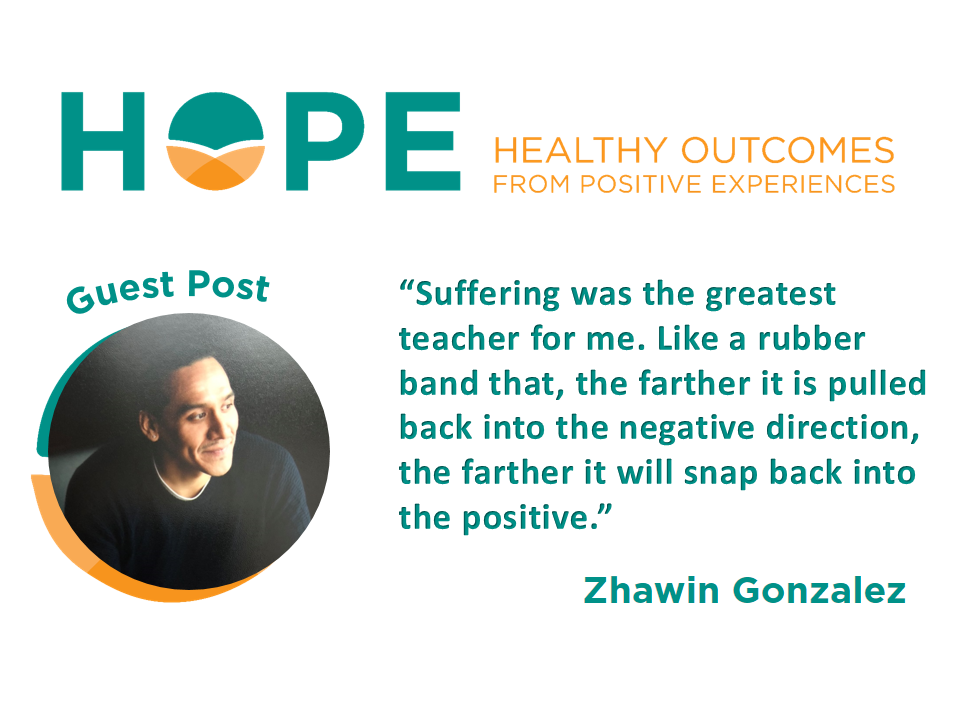
HOPE knows that all families, communities, and cultures have inherent strengths. In recent webinars with The Montana Institute, we’ve learned real world examples of this from co-presenters at the Minnesota Indian Women’s Resource Center (MIWRC). Zhawin Gonzalez, or Wasegabo, is the MIWRC Education and Resource Coordinator. In this blog post, Zhawin shares his insight on the long tradition of positive childhood experiences in Ojibwe culture.
Please introduce yourself and your work for our blog readers.
Hello/Bozhoo, my name is Zhawin Gonzalez or Wasegabo (Wa-se-ga-bo), which is my spirit name in Ojibwe. I am enrolled in the White Earth Nation. I’m a parent of three beautiful children and have earned the Father of the Year award for my exemplified passion, stamina and consistency in serving parents in my community throughout the state of Minnesota. I currently work as an Education and Resource Coordinator at Minnesota Indian Women’s Resource Center, empowering Indigenous families. Additionally, throughout the state of Minnesota, I teach others how to heal as a part-time Motivational Consultant at Motivational Consulting, Inc.
Can you tell us about the long tradition of positive childhood experiences in Ojibwe culture?
One long tradition of positive experiences in Ojibwe culture is based in our teachings on gauging one’s success. Unlike our counterpart of Western ideology, measuring success by how much money one makes or how good one is at math, reading, or writing, Ojibwe teachings pass down the tradition of determining how successful one is by how well they treat other people, places, and things. Tell me, what good is it to have all that money, or be the best at numbers or letters, if you are just going to harm other people, places, or things around you?
Ojibwe people interact with their surroundings as if they were one with the universe. When someone in the community benefits, then the entire community benefits, and vice versa. If someone is sick, then we all are in some way, or we are now more vulnerable to becoming sick. That sickness can come as a virus in the body or malady of the spirit. We look at life as if we were gifted with a spiritual bank account (one’s life), and if we keep being overly selfish by taking from life (the universe) too much—by withdrawing, so to speak, from this bank account—we become spiritually bankrupt, creating malady. To alleviate the issue or become spiritually fit, one needs to deposit into our spiritual bank account by giving back to the universe. This can come in many forms, through work which gives back to the community, spiritual activities, helping others without expecting anything in return, etc.
This brings up another teaching of our Western counterpart, capitalism, where one often expects something in return. For example, I hold the door for an elderly person, and I might be upset inside if they don’t say thanks because I helped them. In our teachings, a good person only wants others to benefit, not expecting anything in return, not even a thank you. For example, in one Ojibwe story, there was a medicine woman who invented the art of making fire. She went to some tribes in the North where it was bitterly cold, and she taught them how to make fire. She showed them how to use fire: to cook, keep warm, for lighting, etc. The tribe was so grateful, but before they could express their gratitude, the medicine woman disappeared. She wasn’t concerned with recognition, she was only concerned about their well-being. These teachings provide children with the proper instructions on how to be spiritually sound, preventing them from causing trauma to themselves and others around them.
What are some key positive experiences that have shaped your own life and work?
One key positive experience was a nurturing relationship I developed with a spiritual advisor. This advisor was an elder in my community whom I looked up to, and he means a great deal to me personally, as he was a key pillar of health in my life. This individual would begin to teach me how to live in two worlds. One I am born into, and that world, I have very little control over. Then there is the world I build. I live in that world every moment. I decide who lives in that world with me, I decide the kinds of places that exist in that world, and I decide the types of things I use to build that world, and that is the world I am responsible for. My children live in that world with me. I took hold of a situation that was getting out of hand and took it upon myself to be a part of their lives. As a father, I now have full physical and legal custody of them. I do not see them as ‘my’ children, but as the Creator’s children. In the world I build, ceremony is a place that exists. I willingly attend our cultural ceremonies on a regular basis for spiritual fitness. My advisor’s teachings about these two worlds probably saved my life, as I was spiritually sick at the time.
I lost good standing in society, and my children left me through the child protection system, along with my wife and job. Eventually, my skills left me and I had absolutely nothing. Today, I am a graduate student at a private university, and as previously stated, I work as a motivational consultant throughout the state of MN. I use my history in a positive way. Suffering was the greatest teacher for me. Like a rubber band that, the farther it is pulled back into the negative direction, the farther it will snap back into the positive.
I realized the world I build didn’t change the way I lived, but that I changed. When I was younger, I was traveling with a friend to the reservation, and we stopped to rest and use the restroom. I looked at the scenery, and it looked ugly to me. I couldn’t wait to get back to the city. Years later, when I recovered my mind, the same exact area and looked beautiful. The place looked the same, all the trees and animals were still there, but this time all was well. The birds were flying high and squirrels were gathering nuts and the wind all blowing. The place didn’t change, my being did.
Shifting our focus to current concerns, how is Covid-19 disproportionately affecting the Native American community, and what are individuals/communities doing to cope? What systemic support is needed?
Spiritually, our Midewin ceremony or Grand Medicine Society has been closed, and some people were devastated by this decision, as it is the source of many of our sanities to remove ourselves from the greater world and isolate ourselves around the ceremony. I cannot speak on the details of this ceremony as it is sacred. However, individuals/communities are coping by getting outside, at a safe distance of course, and continuing to build that connection with the Great Spirit, or energy that surrounds all of us. Midewin is a great way to achieve a hard reset, but we as anishinabe have so much spirituality in our daily lives. Individuals continue to build their relationship with the Great Spirit simply by talking to it, just how if I and you don’t talk, we don’t have a relationship. Working for this higher energy is the greatest job in the universe! It pays one in miracles, as that is the natural order of things. Now that our Midewin ceremony or Grand Medicine Society has been closed, some systemic supports needed are resources or money funneled into helping build safely distanced areas and procedures, specifically for spiritual concerns—we see churches all over the land but not our ceremonial lodges.
What is helping individuals to heal from generations of historical trauma due to colonization, and how can systems support that healing?
Decolonization is helping individuals to heal from generations of historical trauma due to colonization. Systems and institutions can support this healing by encouraging, supporting, and allowing traditional practices, values, and beliefs to occur in Native American communities. Not only internally, so we have cultural backings in our own community, with our own people, but also externally fused with dominant Western practices, working together as one big organism. Funding Ojibwe language tables in the community is one example. Funding medicine men and women, like how priests get salaries, is another example.
Create positive imagery of Indigenous peoples instead of dehumanizing them, as federal policies once did. To this day, I still feel the impact of the “take the Indian out the child” policies. I remember my grandfather (my mother’s father) sharing a story with me when I was 10. He told me how he was kidnapped from his family when he was my age and taken to a strange place, where he couldn’t speak his language nor practice his culture. He eventually met my grandmother there, and they would only speak Ojibwe in the mornings while they cooked breakfast together. I didn’t realize at the time, but only when I grew up and became educated did I realize that he was speaking of boarding schools. He lost all his parental and cultural teachings there, which he would have passed down to my mother to pass down to me.
Fund programs to teach White people to unlearn racism and stop discriminating against others for something as meaningless as pigmentation. We must focus on underlying problems and teach the real, forgotten history of systemic racism in the country, in schools and elsewhere. For example, people need to know about unconstitutional federal public housing policies that create segregated neighborhoods, and new federal policies are needed to begin making a dent in all the disparities people of color are facing. The federal government oppresses communities of color, and it is a federal obligation to address its wrongs. Remember that we are all holy and sacred beings.
This interview was compiled and edited by Chloe Yang.


